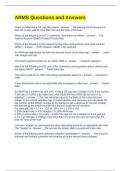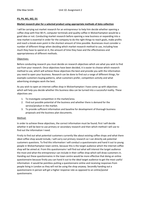1. When it is safe for you to approach a victim, you should attempt to determine the victim's responsiveness by
______.
tapping and shouting
2. What are the effects of shock?
1) Reduced oxygen to body tissues and organs,
2) Low body temperature due to restricted blood flow,
3) Reduced blood flow to body tissues and organs
3. The "O" in the DOTS of victim secondary assessment stands for:
Open Injuries
4. At the scene of a traffic collision, you find an unconscious victim inside one of the vehicles with evidence of a
neck injury. How do you open the airway?
Use the jaw-thrust maneuver
5. When giving back blows or chest thrusts to an infant, what is the correct position for the infant's head and chest?
The head should be lower than the chest
6. Place the following links in the chain of survival in the correct order by dragging each link on the left to the chain
(list) on the right.
1) Immediate recognition of cardiac arrest and activation of the emergency response system,
2) Early cardiopulmonary resuscitation (CPR) with an emphasis on chest compressions,
3) Rapid defibrillation,
4) Effective advanced life support,
5) Integrated post-cardiac arrest care
7. A MILD airway obstruction is a condition in which
1) the victim indicates an airway problem but is able to speak or cough 2) an adult is conscious and violently
coughing and red in the face from the ordeal
8. Which of the following images shows a victim in the correct recovery position?
(Photo of guy laying on side with knees tucked toward chest)
9. You should check for indications of life-threatening conditions and place the victim in the recovery position if the
victim has
10. What type of problem would an officer expect to find while performing a secondary assessment?
Dislocated shoulder
11. What are the first aid measures for an impaled object?
, 1) Stabilize the object to avoid additional damage during treatment, 2) Apply pressure on both sides of the object
to control bleeding, 3) Expose the wound
12. For an avulsion, when the body part is not completely separated, you should place the separated tissue back in
place before applying dressings or pressure bandages.
True
13. An officer who has conducted a secondary assessment of vital signs of a conscious victim should be prepared to
advise EMS of their assessment results, including respiratory rate and pulse.
True
14. What is the correct hand position for performing abdominal thrusts on a conscious adult?
On the middle of the abdomen, just above the navel and well below the lower tip of the breastbone
15. Place the bleeding control measures for an open wound on an extremity in the correct order.
1) Expose the open wound site
2) Assess for possible fractures associated with the open wound
3) Apply direct pressure
4) Apply pressure bandage
5) Apply a tourniquet
16. What could compromise a drowning victim's airway?
Vomit
17. What is the correct hand position for clearing a severe airway obstruction on an obese or pregnant adult?
On the midline of the sternum, level with the armpits
18. What is the normal breathing rate for a Child (1 year to puberty)?
19. Shock is a life-threatening condition.
True
20. Which of the following statements is true regarding direct pressure?
Direct pressure should be applied using a gloved hand or clean dressing until bleeding is controlled.
21. Identify which of the following apply to the use of a hemostatic dressing.
1) After applying the dressing, apply direct pressure,
2) Tightly pack the wound with hemostatic gauze
22. You find an accident victim who is unconscious, and there is no evidence of a spinal injury. To ensure an open
airway, what should you do?
Use the head-tilt/chin-lift maneuver
23. Confusion, combativeness, and anxiety may be symptoms of shock.



